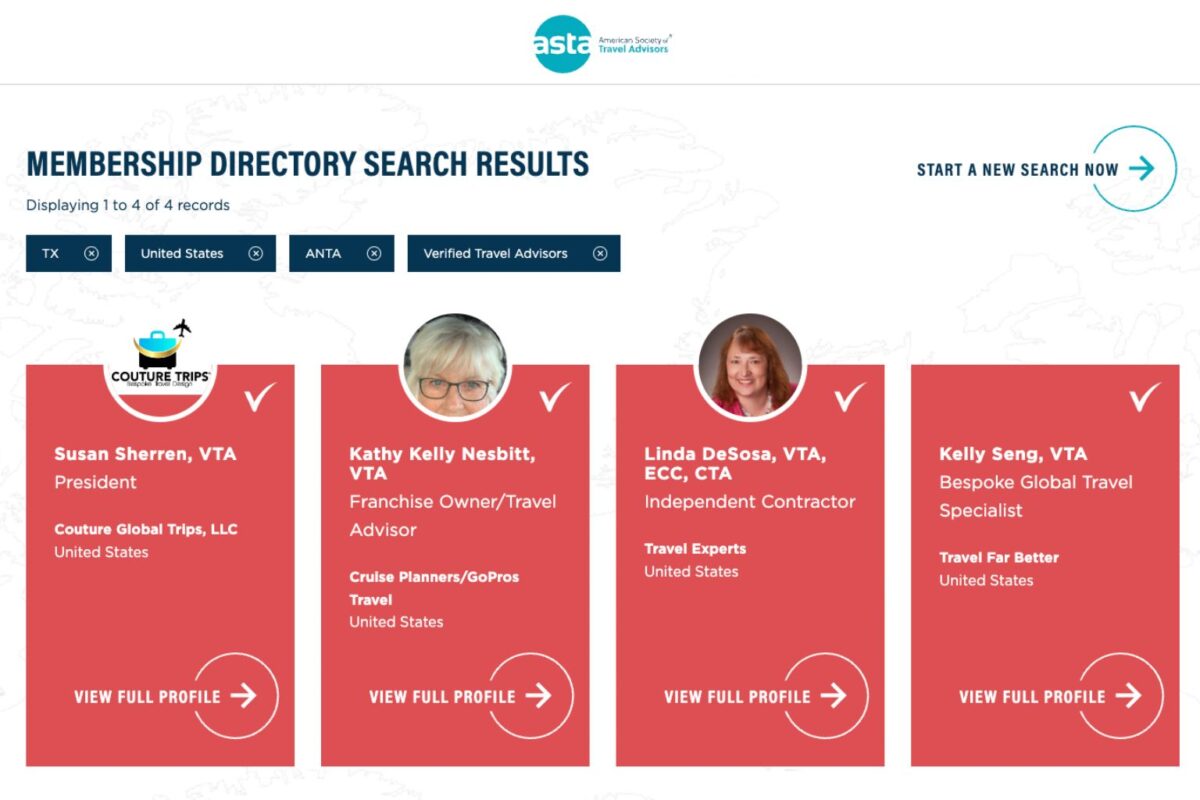James Vandehaar needs a travel advisor. And not just any travel advisor, but someone who specializes in solo travel abroad — for seniors.
“I’m interested in an Antarctica cruise,” says Vandehaar, a retired manager for a laundry equipment sales company in Coppell, Texas.
You’ve probably heard that you should consider hiring a professional for complicated trips like cruises, tours or around-the-world trips.
But what type of professional?
To answer that question, we first have to figure out what a travel advisor does and how one can help you.
Do people still use travel agents?
Yes, they do. A travel agent — or travel advisor — is a professional who can assist you with planning and booking a trip. A qualified travel advisor can offer various services, from helping you get a passport to booking airline tickets, cruises, car rentals, hotel rooms, or tours. Travel advisors can also offer information about the destination that you won’t find online — where to go, where to eat, what to see, and maybe most importantly, what to avoid.
Note: Travel advisors are not free, and the economics of travel agents can be complicated and controversial. You will pay a service fee of somewhere between $35 and $250 for each trip. I’ll have more on the true costs of a travel advisor in a minute.
Do you need a travel advisor?
You might. Here are the times when you should consider working with a travel advisor:
If you don’t have a lot of time
A competent travel advisor can help you quickly narrow down your destination options based on your interests and budget. They can research the best deals on flights, hotels, and activities and then book your travel arrangements. If you’re working with a true expert, that person can create a detailed itinerary with restaurant recommendations and activities, saving you hours of research. If you’re short on time, hiring a travel advisor can be a great way to save time and stress.
When you want to talk to a live person
Travel advisors with physical offices are available for appointments. They offer the convenience of face-to-face interaction. Certain agencies even offer round-the-clock assistance, a feature usually associated with big corporations. If you prefer dealing with someone you’ve met, a human travel advisor is an excellent choice. Keep in mind, some agents work remotely from home, but you still might be able to meet face-to-face or at least over Zoom.
If you have a special interest
Planning a one-of-a-kind getaway? There’s probably an agent out there specializing in the exact type of vacation you’re dreaming of. If luxury travel is your thing, explore agents affiliated with the prestigious Embark Beyond network. For disability travel, look for advisors who are members of the Society for Accessible Travel & Hospitality.
When you need expert guidance
The best travel advisors dedicate their careers to mastering specific destinations and types of travel. They seek out certifications from recognized organizations like The Travel Institute, which authenticates their deep expertise.
If you want access to exclusive deals
Travel agents often have access to deals and discounts that are not available online. The agents, usually via a large travel agency network, have special relationships with hotels, airlines, and other travel providers. For example, a travel advisor may be able to get you a room upgrade or a flight discount if you book through them. Even if they don’t have any special deals to offer, a good travel advisor can sometimes negotiate a discount on your behalf.
If you need an advocate
A competent agent can handle all the details of your trip, from planning to reservation. You just have to say “OK” — and hand over your credit card information. Also, if something goes wrong, your agent will have your back and can find a way to fix almost any travel problem.
When do you not need a travel advisor?
But not every trip needs a travel advisor. You can easily plan some of your trips on your own, without the help of a professional;
- If you know your way around travel and are comfortable booking your flights and hotel rooms online, you don’t need a pro.
- If you’re planning a straightforward, point-to-point flight to a city you know well, a travel advisor may be overkill.
- A road trip to visit a family member over the holidays does not need to involve a travel advisor.
- If you’re going somewhere unusual for an extended period of time, like a gap year trip by backpack, a travel agent probably can’t help.
Even if you think a travel advisor can’t help, it’s always a good idea to ask. You never know — a pro might be able to make a simple trip even better. I have more information on trip planning, including the pros and cons of using an online agency, in my ultimate guide to planning a trip.
Is it cheaper to book online or through a travel agent?
You’ll probably pay slightly more through a travel agent — but not always. Even after factoring in your travel agent’s fees, a knowledgeable advisor might have access to some deals that more than offset the cost of an advisor. Note: Comparison shopping between an agent and a travel site is absolutely fine. If you see a great price online, call your agent to see if they can find a lower price. You never know.
How much does a travel agent cost?
As I mentioned before, the economics of travel advisors is complicated. Travel professionals get paid from a variety of sources.
1. Commissions
A travel advisor will earn commissions from car rental agencies, cruise lines, hotels and tour operators. These can range from 5 percent to more than 15 percent of the total cost of the trip. They earn even higher commissions if they book a certain number of trips. These incentives are called overrides.
2. Service fees
Most travel advisors charge a flat fee for their services, as I already mentioned. They can range from $35 to $250 — that’s the typical range — but I’ve seen them go higher. The fee can be per trip, or your agent might charge an annual fee.
3. Consultation fees
Some travel advisors charge for their time, whether you book a trip or not. These fees vary wildly. A top-tier agent may charge thousands of dollars. A part-timer may charge nothing at all.
4. Package fees
If a travel advisor puts together a package that includes air, hotel and activities, it may include a “package fee” that covers their time. Look for this fee on your invoice. It may be a flat fee or a percentage of the value of your trip.
Bottom line: Before you hire a travel advisor, run the numbers. If you’re planning a simple trip and have lots of time to do the work yourself, you may be able to avoid using a professional. But if you don’t have a lot of time and need to plan a complicated trip, you’ll need an expert.
Is it cheaper to use a travel agent or do it yourself?
It depends. Most travel agents charge a fee, but some do not. If you’re booking a complex trip, a travel agent can save you time and money by negotiating discounts and finding the best deals. But if you’re comfortable booking your own trip, you can often save money by booking yourself.
How do I find a real travel advisor?
Finding a travel advisor is easy. Finding a great advisor is not. Here’s how to start your search:
Through a professional organization
The most commonly used directory is the American Society of Travel Advisors (ASTA), the largest professional organization of travel advisors. But if you’re looking for a specialized trip, you might also want to consult some other professional organizations. For example, if you’re cruising, look for membership in the Cruise Lines International Association.
Through a host travel agency
A host agency is a company that supports travel agents with ticketing, operations and fulfillment support. Participation in a host agency such as American Express, Nexion Travel Group and Travel Leaders can be a sign that your agent is a real pro and will take good care of you. Many host agencies also list their members online.
Through a travel agency consortium
A consortium is a group of travel advisors who share marketing, training and negotiation resources. They include companies like Cruise Specialists, Ensemble Travel Group, and Signature Travel Network. Being in a consortium is also a sign that your agent is serious (or seriously good). Sometimes, the functions of a host agency and a consortium can overlap, so don’t get confused by the labels.
Through a fellow traveler
Ask a friend. A word-of-mouth recommendation may be the most effective way to find a great agent. What’s more, there’s extra accountability because of the previous relationship with your friend or family member.
Putting it all together
So what should Vandehaar do? The ASTA site is a great place to start. You can search by geographic area (in Vandehaar’s case, Dallas) and specialty (the Antarctic). ASTA also lets you narrow your search to “Verified” travel advisors. Verification is an extra level of certification offered by ASTA.
That gives us the following results:

I found a travel advisor. Now what?
Now that you have the name of a travel professional who can probably help, what should you do?
Ask for references
A competent travel advisor should be happy to send you a list of past clients and their contact information. They may need to get permission from their clients before sharing their contact information, but they should be able to provide you with credible testimonials.
Here are some questions you can ask potential travel advisors when asking for references:
- Can you provide me with a list of past clients?
- Would you be willing to put me in touch with some of your past clients?
- Can you provide me with any testimonials from past clients?
If a potential travel advisor is unwilling to provide you with references, that’s a red flag. A good travel advisor should be proud of their work and be happy to share their clients’ experiences with you.
Verify their professional memberships
Most reputable travel advisors are members of professional organizations such as the American Society of Travel Advisors (ASTA) or the Cruise Lines International Association (CLIA). These memberships indicate that the advisor is committed to ethical standards and best practices in the travel industry.
Here are some ways to verify a travel advisor’s professional memberships:
- Ask the advisor to provide you with a copy of their membership card.
- Check the advisor’s website or social media pages for a mention of their memberships.
- Contact the professional organization directly to verify the advisor’s membership.
If a travel advisor is unwilling to provide you with information about their professional memberships, that’s also a red flag. A reputable advisor should be proud of their memberships and be happy to share this information with you.
Check for travel advisor accreditations
The most common travel advisor accreditations are the Certified Travel Associate (CTA) and the Certified Travel Counselor (CTC). The CTA is a lower-level accreditation, for agents with less than five years’ experience. Both accreditations require passing an exam and meeting certain educational and experience requirements.
If a travel advisor is accredited, it’s a sign that they are knowledgeable and experienced in the travel industry. It also shows that they are committed to continuing education and professional development.
Here are some ways to find out if a travel advisor is accredited:
- Ask the advisor directly.
- Check the advisor’s website or social media pages for a mention of their accreditations.
- Contact the accrediting organization directly to verify the advisor’s accreditation.
If a travel advisor is unwilling to provide you with information about their accreditations, that’s a bad sign.
Verify their Seller of Travel number
Many states require travel sellers to register with the state attorney general’s office and display their registration number. This doesn’t guarantee the company is reputable, but a lack of registration can be a problem.
California has some of the strictest rules for travel sellers. Ask to see the travel seller’s registration acknowledgment, a one-page document issued by the California Attorney General’s Seller of Travel Registration Unit. You can also find information about registered companies on the California Department of Justice website.
Here are some ways to find out if a travel seller is registered:
- Ask the seller directly.
- Check the seller’s website or social media pages for a mention of their registration number.
- Contact the Attorney General’s office in the state where the seller is located to verify their registration.
If a travel seller won’t give you a registration number, it’s a problem. A reputable seller should be able to share the information with you.
Check their Better Business Bureau (BBB) rating
The BBB is a non-profit organization that collects customer reviews and ratings of businesses. Although BBB ratings can be manipulated — often in favor of the business — a low or failing grade is a sign that the agency with which you’re thinking of booking a trip won’t meet your expectations.
Here are some things to look for when checking a travel agency’s BBB rating:
- The overall rating: A number from 0 to 100, with 100 being the highest rating.
- The complaint history: A list of complaints that have been filed against the business.
- The response to complaints: How the business has responded to complaints.
- The number of reviews: The number of people who have reviewed the business.
If a travel agency has a low or failing rating, it’s best to look for another agency. However, don’t be suspicious just because an agency doesn’t have a BBB rating. After all, you have to pay to belong to the BBB.
Trust your gut
You know when you like someone. If you don’t feel a connection with a travel advisor, it’s best to look elsewhere. You’re about to spend a lot of money on a bucket-list vacation, and you need someone who is on the same page as you.
Here are some things to look for when evaluating a travel advisor:
- Do you feel comfortable talking to them?
- Do they seem knowledgeable about the destinations you’re interested in?
- Are they responsive to your questions?
- Do they seem excited to help you plan your trip?
- Do they follow through as promised?
If you answer “no” to any of these questions, it’s best to look for another advisor. You
want someone who you can trust to help you plan the perfect trip.
What is a travel coach?
Travel coaches are like life coaches for your vacation. They help you figure out what you want to get out of your trip and then create an itinerary that will help you achieve your goals. They can also help you with things like budgeting, planning, and logistics.
Most travel coaches do not book trips for you.
If you’re looking for a more personalized travel experience, a travel coach can be a great option. They can help you make the most of your time and money and ensure that you have a trip that you’ll never forget. But they do not have the full-featured services of a travel professional.
You can find a directory of certified travel coaches at The Travel Coach Network.
How do you find the best travel advice?
Whether you go with a travel coach or travel agent, you’ll want to keep a few things in mind as you look for the perfect travel advisor:
You rarely find a keeper on your first try
I’ve been covering the travel industry for decades and have encountered all kinds of travel agents — good, the bad and the ugly. There are plenty of nice agents out there, but not many who are nice and competent. Chances are, you will find an agent who checks all the boxes but may not come through for you on your first or second trip. Don’t worry, that’s completely normal. Move on to the next person on your list. You rarely find a keeper on your first try.
Remember, agents have split loyalties (even the good ones)
If you do the math, it quickly becomes clear that no one can survive by charging $200 booking fees. Agencies also take commissions from travel companies, which means they are working both sides. Be aware of that. Some all-inclusive hotel chains offer outrageous bonuses to get more agents to book their hotels. And while agents swear they would never steer you to a property that isn’t great for you, there’s no question that certain properties are also great for them. Just something to keep in mind.
This conversation is the ultimate litmus test
One final observation: While many travel advisors are true professionals, some agents see their occupation as more than a job. They react defensively to any criticism of the travel agency community — even constructive criticism. The litmus test of a pro, in my opinion, is that you can have a reasonable conversation about commissions with your advisor. If they tell you that their commissions are none of your business, you may have an agent who puts profits over people.
Vandehaar now knows where to find a nearby travel professional who can help him find a perfect Antarctic cruise. But his work has just begun. He’ll need to screen the agents he’ll find and then make a decision. And it’ll be a while before he knows if that advisor is a keeper.




